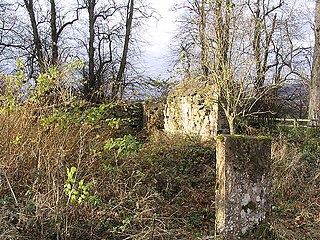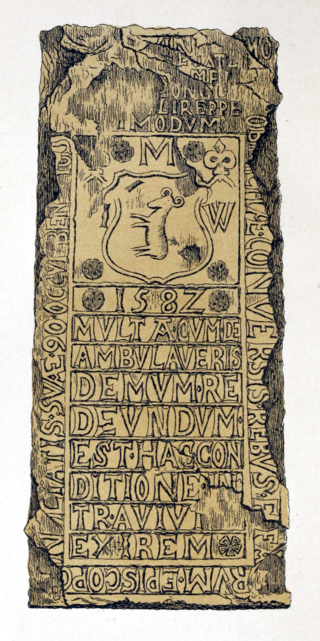
David Calderwood was a Scottish minister of religion and historian. Calderwood was banished for his nonconformity. He found a home in the Low Countries, where he wrote his great work, the Altare Damascenum which was an attack on Anglican episcopacy. He was present at the Glasgow Assembly in 1638, and saw episcopacy and the high church liturgy swept away from the Church of Scotland. He died at Jedburgh, a fugitive from his parish of Pencaitland; and buried in the churchyard of Crailing, where the first years of his ministry were spent.

Robert Pont (1529–1606) was a Church of Scotland minister, judge and reformer. He was a church minister, commissioner and a Senator of the College of Justice.
John Douglas was Protestant Archbishop of St. Andrews from 1571 to 1574. As was tradition from the fifteenth to the seventeenth centuries, the Archbishop also took on the role of Chancellor of the University of St Andrews, as the University had strong links with the Pre-Reformation church.

John Winram was a 16th-century Scottish priest and ecclesiastical reformer. He was born in 1492, the son of one James Winram of Ratho and his wife Margaret Wilkie. He obtained a Bachelor's Degree (1515), a Master's Degree and a Doctorate (1541) from St Leonard's College, University of St Andrews.
John Durie (1537–1600) was one of the first Presbyterian ministers in Edinburgh after the Reformation in Scotland.

Robert Bruce was Moderator of the General Assembly of the Church of Scotland which was called on 6 February 1588 to prepare defences against a possible invasion by the Spanish Armada. King James VI was so sensible of the valuable services of the church in preserving public tranquillity, during his absence in Norway on the occasion of his marriage, that in his letters to Bruce he declared that he was "worth the quarter of his kingdom." John Livingstone, the preacher at the Kirk of Shotts revival, said of Bruce "in my opinion never man spake with greater power since the apostles' dayes".
Patrick Galloway was a Scottish minister, a Moderator of the General Assembly of the Church of Scotland. He was Moderator of the General Assembly in 1590, and again in 1602. Having been completely gained over by the Court party he used all his influence in forwarding the views of the King for the introduction of Episcopacy.
Walter Balcanquhall (1548–1617), was one of the first Presbyterian ministers in Edinburgh after the Reformation in Scotland.
The disastrous General Assembly of Aberdeen was held in 1605. A few ministers of the Presbyterian party met in defiance of royal authority as the general assembly was prohibited by royal proclamation. There was doubt about the legality of the sederunt and the cancelling or the prorogation of the assembly; several of the ministers denied that the king had the authority in what they regarded as a purely spiritual matter. The king disagreed and several who met were tried at Linlithgow for high treason and exiled. They were: John Forbes of Alford; John Welch of Ayr, ; Andrew Duncan; Robert Dury, Anstruther; Alexander Strachan, Creich; and John Sharp, Kilmany. After the assembly King James gave more power to his bishops.
David Black was educated at the University of St Andrews. He was admitted to the ministry of the church as minister of St Andrews in November 1590. Having offended James VI by "certain unreverent, reproachfull and infamous speeches in his sermons", he was summoned before the Privy Council on 18 November 1596, but declined its jurisdiction "in matters spiritual". In this he was supported by "his whole brethren of the ministrie". Twelve days later he lodged a second declinature, but was found guilty on 2 December, and "the penaltie referred to the King's will and pleasure". On 9 December he was ordered to enter his person in ward. The Synod of Fife petitioned the King to restore Black to his charge, but that was not done, and he was translated, and admitted to Arbirlot in 1597. He was presented to the vicarage by James VI on 15 May 1598. "While on his way to Perth he died suddenly at Dundee, of apoplexy, immediately after having given thanks at a meal, Tuesday 12 January 1603. He had preached and dispensed the Communion on the preceding Sunday.
William Row (1563–1634) was a Scottish presbyterian divine.
John Spottiswood (1510–1585) was a religious reformer in 16th century Scotland.

John Davidson (c.1549–1603) was born in Dunfermline, where his parents owned property in houses and lands. He entered St Leonard's College, St Andrews, in 1567, and after graduating, became a regent of the college, pursuing the study of theology. Being introduced to John Knox, he set himself to advance the cause of the Reformation, and one of his earliest services was the production of a play intended to expose the errors of Romanism, which was acted in Knox's presence. In 1573 there appeared from his pen Ane Breif Commendation of Uprightness, a poem in praise of Knox, with accompanying verses on the Reformer's death. Soon after, another poetical tract was issued anonymously, under the title of Ane Dialog, or Mutitait Talking betwixt a Clerk and ane Courteour, concerning foure Parische Kirks till ane Minister. This was a reflection on the Regent Morton, who had been uniting parishes under one minister to secure part of the benefices for himself. The Regent was deeply offended. Printer and poet were put in prison. On his liberation, he lay hid for a time at Kinzeaneleugh, Ayrshire, the residence of his friend Robert Campbell. He then retired to the Continent, where he remained for about three years. In 1577, at the urgent solicitation of the General Assembly, Morton permitted his return, and in 1579 he became minister of Liberton. In June 1581, Morton being under sentence of death was visited by Davidson. Going for a time to London, he became known at the English Court, and from the earnest style of his preaching was called the thunderer. Returning, he did not resume his charge at Liberton, but officiated in various places. and acted as minister of the Second Charge of Holyrood. In 1595 he became minister Prestonpans, and built a church and manse at his own expense. He vigorously resented the proposal that certain of the clergy should sit and vote in Parliament, and words that he then uttered were often repeated : "Busk him, busk him as bonnily as ye can, and bring him in as fairly as ye will, we see him well eneuch, we see the horns of his mitre." He was summoned before King James at Holyrood, and committed to Edinburgh Castle, but released, and allowed to return home, though interdicted from going beyond the bounds of his parish. He died in September 1604.
Andrew Duncan was a Latin scholar and Church of Scotland minister at Crail. He achieved notoriety for his presbyterian principles which brought him into conflict with James VI who wished to impose an episcopalian system. He attended the General Assembly of Aberdeen in 1605 which had been proscribed or prorogued by royal authority and was one of six ministers who were imprisoned and later exiled as a result. He was allowed to return after several years in France but was subsequently banished again following further controversy in failing to comply with the Five Articles of Perth. He died in exile in Berwick-upon-Tweed in 1626.
John Sharp was a theologian and Church of Scotland minister. He achieved notoriety for his presbyterian principles which brought him into conflict with James VI who wished to impose an episcopalian system. Sharp graduated with an M.A. from St Andrews in 1592. He was admitted to Kilmany in 1601. He was one of those who, in opposition to the Royal command, attended the General Assembly of Aberdeen. For this he and five other ministers were committed to the Castle of Blackness on 2 August. He was brought before the Privy Council at Perth on 27 August and interrogated as to the constitution of the Assembly. Not giving satisfactory answers they were tried before the Justiciary Court at Linlithgow on 10 January 1606, on a charge of treason, found guilty, and banished for life. On 23 October Sharp went to Bordeaux and became Professor of Theology in the University of Die, but would probably have returned to Scotland had honourable terms of reconciliation been offered him. In 1630 he was compelled to leave France at the instance of Cardinal Richelieu, the Prime Minister, who had grown jealous of Sharp's reputation as a Protestant teacher. Sharp was appointed Professor of Divinity in the University of Edinburgh on 17 November 1630. He died about 1647, aged 75.
John Scrimgeour, was a Presbyterian minister at Kinghorn in Fife. He went as a minister with King James to Denmark, when the monarch went there to fetch home Anne, his young bride to be. He is best remembered for his opposition to the Five Articles of Perth. He would not for example observe holy days other than the sabbath and would not have his congregation take the knee for communion; this led to his being deposed from the ministry of the church. He is also remembered having a verbal exchange with John Spottiswoode in which the archbishop is recorded as saying about King James "I tell you, Mr Johne, the king is Pope now, and so sail be." to which Scrimgeour is said to have replied: "It is an evill [title ?] ye give him." Scrimgeour was banned from taking church services, put out of his parish and put under house arrest but nevertheless he did occasionally help officiate at communion services.

James Lawson was the Church of Scotland minister who succeeded John Knox at St Giles' Cathedral in Edinburgh. Lawson's great educational achievement was the founding of the University of Edinburgh. He may be said to have been its principal promoter, and its best and wisest friend during the first year of its history, 1583.
Archibald Simpson, born in 1564, was a Christian minister, author and poet in Scotland.
James Carmichael (1542/3–1628) was the Church of Scotland minister and an author known for a Latin grammar published at Cambridge in September 1587 and for his work revising the Second Book of Discipline and the Acts of Assembly. In 1584, Carmichael was forced to seek shelter in England along with the Melvilles and others. Andrew Melville called him "the profound dreamer." Robert Wodrow said that "a great strain of both piety and strong learning runs through his letters and papers." Dr. Laing says there is every probability that " The Booke of the Universall Kirk " was compiled by Carmichael. The James Carmichaell collection of proverbs in Scots was published by Edinburgh University in 1957 which includes some proverbs also collected by David Ferguson.
Andrew Hay of Renfield (c.1540–1593) was a Scottish minister who served twice as Moderator of the General Assembly of the Church of Scotland in both 1573/4 and 1580/1. From 1569 to 1586 he was also Rector of the University of Glasgow.






